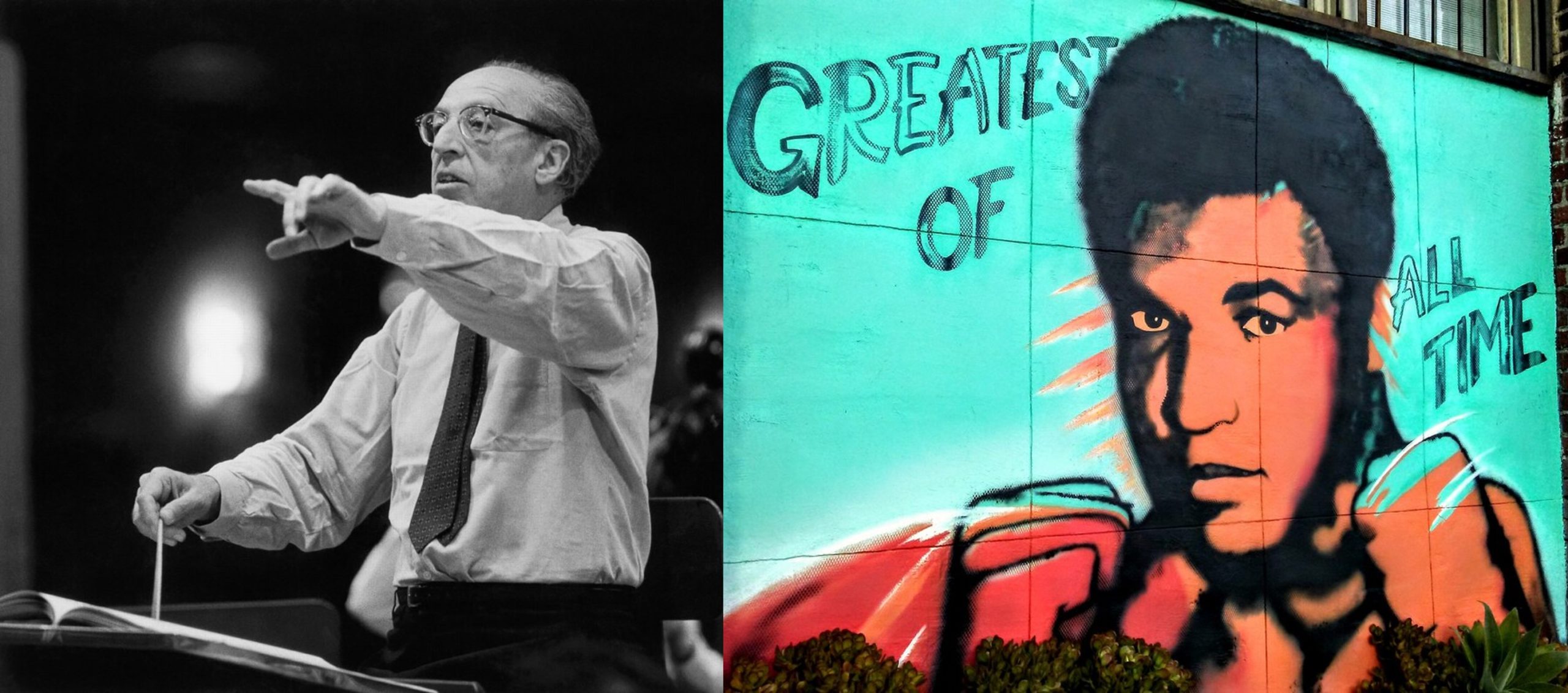
I bet you didn’t realise there was a link between Aaron Copland and Muhammad Ali? Neither did I, but sometimes the stuff I turn up seems to be like buried treasure that is just waiting for me to unearth it.
I am fascinated by horizontal learning and peculiar connections. When it comes to history, I am curious to find out the context. So, as I get to know about a great person or an event from the past my mind immediately starts to wonder what else was going on at the same time in the world of music, art, science and sport. As a result, I end up going down many a rabbit hole discovering amazing relationships and coincidences that I would never have found in the history books.
The seed is sown
A few weeks ago, the seed of my latest foray must have been sown when I heard Anthony McGill, the lead clarinettist of the NY Philharmonic talking about his new record release on BBC Radio 3. The record, a collaboration with the Pacifica Quartet called American Stories includes a piece for clarinet and string quartet called Shotgun Houses. It was composed by Valerie Coleman and depicts the early life of Muhammad Ali (who was then called Cassius Clay). They played the third movement called Rome 1960. It was just the sort of music I like – very rhythmic, highly motivic, great tunes, some pathos and a rousing ending. Quite Coplandesque you might say? Naturally, I added the album to my Spotify account and gave it several listens. I wondered how I might be able to get it played in Bristol – these daydreams go through my head every time I hear a new piece that I like!
Flashback: 2020 Vision
Now cast your mind back to 2020. I did a year-long Copland Tweet of the day. I posted something about every movement of every work. 366 tweets – it was quite an undertaking but was a real balm to the Covid-19 inertia.
I was lucky that a recent Chandos album by John Wilson and the BBC Philharmonic had divided up a couple of my favourite single movement works (Symphonic Ode and Orchestral Variations) into individual tracks. This was gratefully received as with the latter, in particular and its precursor the Piano Variations, I had once in a while tried to work out the individual variations. It’s not easy as they vary from about 10 seconds to over 90 seconds. So, the fact that Chandos had done this for me was an absolute gift allowing me to write something about each of the component parts, what it reminded me of, the mood of the variation, the orchestration etc.
Back to the present day
Last week I was coming home from a trade fair in Birmingham. It had been a long day, I was talked out and needed something non work related to help pass the 95 minute train ride. I have a folder of Copland miscellany on a memory stick for just such occasions! I looked at my descriptions of the Orchestral Variations whilst I listened to them. I added some more notes and was suddenly struck by how this compelling opus is another Copland Greatest Hits compilation. I had previously described Dance Panels in this way as the ballet is like an amalgamated highlights reel of his whole body of work. In that case, the similarity lies mainly with Copland’s populist and Latin inspired works. With Orchestral Variations there is a marked contrast. The greatest hits here are all much more suggestive of his modernist inclinations and the lesser-known incidental film music and ballets – most are not easy listening. Interesting too that Orchestral Variations was written in 1957 and Dance Panels in 1959, both comparatively late in Copland’s composing career. They do therefore come across as excellent anthologies which serve as perfect starting points from which to explore Copland’s entire creative canon.
As I pondered this concept of “Greatest Hits” and listened intently to the music which has frequently been described as “violent”, “brutal” and “severe” a thought started to enter my brain. It must have been the combination of “The Greatest”, the idea of “Hits” and the fact that in places the sharp, jabbing musical notes sound like a boxer hitting a speedball, that the realisation dawned on me….. Wouldn’t the music of Orchestral Variations be an amazing ballet if choreographed to a boxing match?
Orchestral Variations – a new perspective
With that idea in your mind, I challenge you listen to Orchestral Variations again. I think it’s quite uncanny particularly in the latter half when Copland ramps up the intensity by several notches. The 20th variation has always been my favourite. It really is a huge commotion and gives the impression of a fight of the ages with a tremendous combination of punches leading to a knockdown. The Coda follows and it sounds to me like a hero standing up, arms aloft, bruised, battered but ultimately triumphant. Of all of the boxers that this could be, Muhammad Ali was the image that came into my mind.
Rabbit hole revelations revealed
My homeward journey whizzed by. I was really excited by this idea – a boxing ballet! As always when I get caught up with an idea, I read all the relevant sections of my extensive Copland library. First point of call was Howard Pollack’s biography. I was amazed by what I found. I was reminded that the Piano Variations had previously been choreographed into a ballet, Dithyrambic by Martha Graham in 1934. (The term Dithyrambic means wildly irregular in form or wildly enthusiastic). This was 10 years before Appalachian Spring but this sharp, staccato music apparently influenced her signature style. Also, that the Orchestral Variations were used by Spike Lee in the film He Got Game in the climactic scene when Jesus Shuttleworth’s mother gets killed (see postscript for more on this). But the thing that made my eyes pop out of their sockets was the fact that the Orchestral Variations were commissioned by none other than the Louisville Orchestra. As anyone who knows anything about boxing knows – Muhammad Ali is Louisville’s most famous son – he was nicknamed the “Louisville Lip”. What a coincidence! But there’s more!
Copland worked on the orchestration of Orchestral Variations in 1957 and the premiere took place on the 5th March 1958. At that time Muhammed Ali would have been 16 and just out of high school. I looked up his listing on Wikipedia and found out that he was already boxing by then. I had this thought: Wouldn’t it be amazing if they walked down the same street in Louisville when Copland was there for the premiere? So, just for the hell of it I did a Google search for Muhammad Ali and the date 5 March 1958. Of course I had no expectation of finding anything at all, but…….
The number one hit on Google was an auction site page for a signed program for the 31st Annual Golden Gloves Finals in Chicago for that exact date. The advert gave the impression that the young Cassius Clay was fighting that night. However, a bit more sleuthing revealed that the 16-year-old Ali had not made the semi-final or final as he had lost to eventual winner of the Light Heavyweight title Kent Green 9 days earlier. Ali was rarely defeated in his life but the manner of the loss was a one off – he was knocked out! The only time in his amazing career that he would suffer this ignominy. So, chances are, that Ali would have been back in Louisville, licking his wounds on the 5th March. Aaron Copland and Muhammad Ali might have brushed past each other on the street after all!
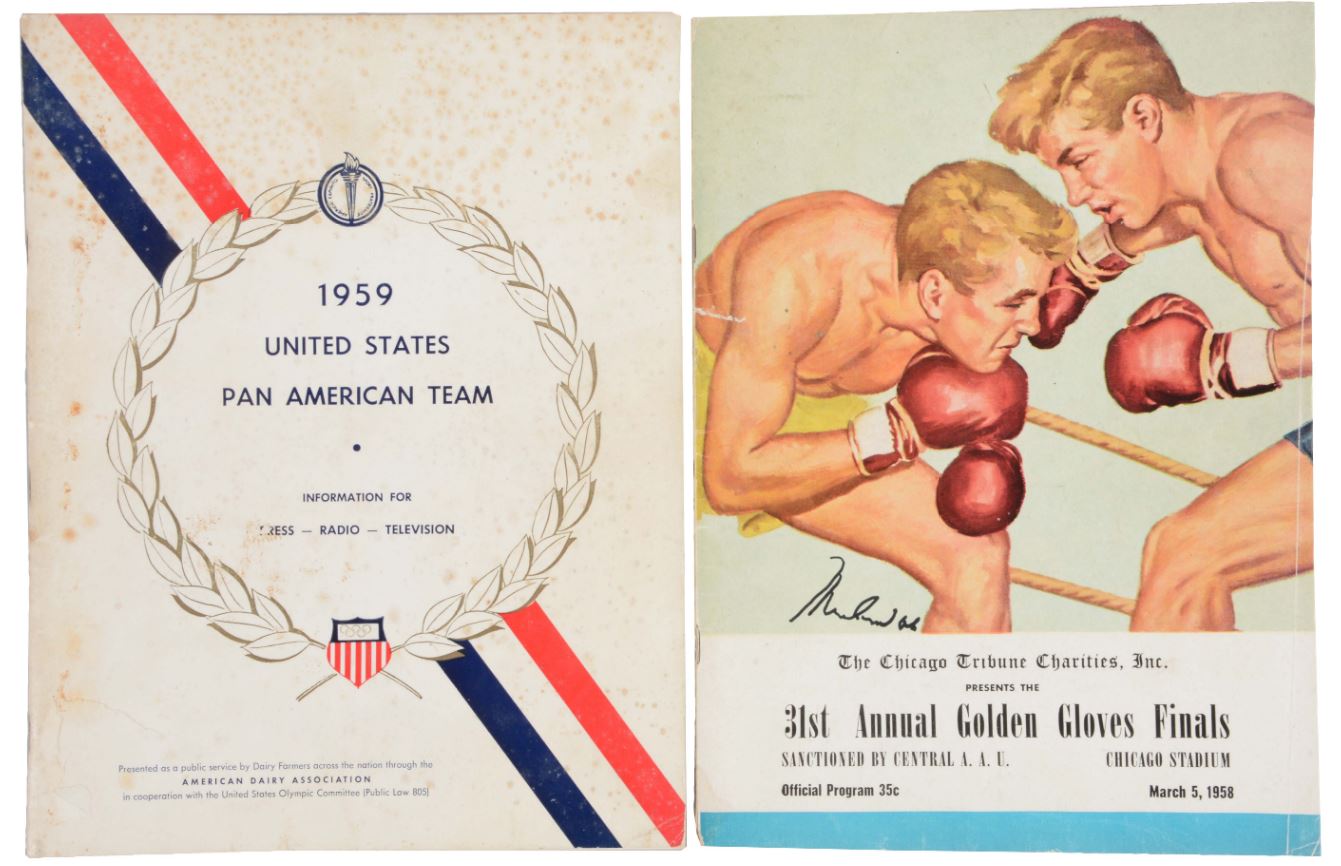
If the young Ali was having a tough time, then the same could be said for Copland. The 50s had been a nightmare decade – his brother Ralph committed suicide in 1952, Copland had faced the McCarthy inquisition, there were several unsuccessful romantic liaisons and his biggest work, The Tender Land turned out to be an even bigger flop.
But on this night in Louisville something happened which although not quite as rare as Ali getting knocked down was still relatively uncharted territory for Copland in his illustrious career. At the end of the 12-minute premiere performance there were jeers and catcalls amongst the applause. Copland wrote in his biography Copland since 1943:
There is something about a boo you can’t forget – I seem to remember more vividly the few times my music was booed than the many times it was applauded.
Isn’t it amazing then that two of the most iconic and successful Americans of the 20th Century were having a pretty rough time in their very different worlds at almost the exactly the same time and in the same place?
When We Were Kings – The Greatest and The Dean
Just for fun, I couldn’t resist looking up some more dates associated with Muhammad Ali. For virtually his entire career he called himself “The Greatest”. It’s probably fair to say, that for most of his boxing career the jury was still out on this. However, one fight in particular changed all that. In defeating George Foreman in the “Rumble in the Jungle” in Zaire and regaining the world title for the third time, the world unanimously agreed with his hyperbole. The date of that epic fight? October 30, 1974. I couldn’t believe it!
There was an almost perfect symmetry here as well. Copland had a dazzling career with many highlights, honours and awards. However, unlike Ali he was not one to put himself on a pedestal above his composer colleagues and hated the fact that he was described as the “Dean of American Compoers”. Surely, it would be nonsensical to try and pick a single date out of Copland’s career when his place in the pantheon of music greats was secured? Ah well, I think I’ll take a punt! My view is that this status was achieved almost certainly on the night of the premiere of the ballet Appalachian Spring. The date of that monumental success? October 30, 1944. 30 years earlier on the very same night!
It’s all pure coincidence I know but wonderful too! Cassius Clay famously changed his name to Muhammad Ali when he became a Muslim. In Islam, the word Kismet relates to the will of Allah but is typically used to refer to fate or destiny or something that was “meant to be”. I certainly think the links in these dates and locations between two incredible human beings, one a Muslim, one a Jew and their meetings with both triumph and disaster has an air of kismet about it!
I’d love to know if Aaron Copland and Muhammad Ali ever did meet or perhaps were once in the same Green Room of a chat show together? It’s a long shot I know, but if you know any information please let me know. In the meantime, perhaps I’ll have to make do by inviting them both to my imaginary dream dinner party!
Ali: The Musical
When I started this journey I had no idea where it was going to lead. During my quest for knowledge I discovered another great classical tribute to Ali by Grammy award winning composer Teddy Abrams – it’s called Float Rumble Rest. Abrams just happens to be the Music Director of the Louisville Orchestra and his fascination with the city’s most famous son also yielded a rap opera back in 2016 called The Greatest: Muhammad Ali (See the clip below). Incredibly, this autumn (or Fall if you are in the States) Abrams will also be premiering a new musical about Ali. Just like Ali himself, the plan is to start in Louisville and end up on Broadway! It will get there in 2025 – the year just so happens to be Copland’s 125th anniversary! I feel another trip across the Atlantic coming up!
Afterthoughts – The big fight debrief
Copland was no stranger to writing music for fight and battles scenes. If you listen to the various scenes from the ballet Hear Ye! Hear Ye! and cues from several of his film soundtracks you’ll realise the similarity with the Orchestral Variations sound.
Hear Ye! Hear Ye! (1934)
Scene 8 – Pas-de-deux continued – First Murder
Scene 16 – Third Pas de deux and Murder
The music for the violent murders described by witnesses/defendents in Copland’s court room ballet is lifted from his earlier vampire ballet Grohg. As such it’s got plenty of frenzy and menace.
Ronald Caltabiano and John Mugge liner notes to the Oliver Knussen/Cleveland Orchestra recording describe the third pas-de-deux as a “Frenzied climax of red hot jazz during which a “maniac” runs in and a gunshot is heard once again”.
Of Mice and Men (1939)
This could be lifted straight out of the Orchestral Variations. By listening to it you can hear Curley’s punches and then the 20-second-long stinger chord as Lennie crushes his hand. Brutal stuff. This is unfortunately not available on Spotify but you listen to the clip and buy it from Chandos. (For more on Copland’s sounndtrack for Of Mice and Men see this book review).
The North Star (1943)
The North Star Battle
Not a fist fight but a battle between the Nazis and the Ukrainian Guerilla fighters. Some definite similarities again with those Orchestral Variations particularly the ebb and flow of Variations XIV to XVI.
The Red Pony (1949)
The Vulture Fight
One of Copland’s great contributions to film music was the introduction of modernism into the least likely places. The Red Pony was marketed as a kid’s movie but the scene when Tom fights the vulture is the stuff of child nightmares and the music is every bit as horrifying as the Shower Scene in Pyscho (only Copland composed this 11 years beforehand).
In the Movie Music UK review of the Intrada CD (sub-titled 100 Greatest Scores of All Time) Craig Lysy describes it as such:
As he sees the dead pony being devoured by the vultures he angrily charges done the hill with vengeance and grabs one, initiating a graphic and brutal fight where he suffers repeated beak bites and talon slashes. Copland scores the scene with a fierce assaultive staccato dissonance carried by screeching strings, horns brutale and discordant woodwinds.”
This soundtrack is unavailable on Spotify. Worse than that though, this incredible piece of shock music doesn’t appear on the CD either. I have to say that this is a travesty especially when there are some pretty poor throwaway extras (such as Fur Elise included). As such, you’ll have to watch the film which is available in full on YouTube. This scene begins at: 1:12:10.
The Heiress (1949)
Hatred
Included here as Copland used a Piano Variation that hit the cutting room floor in this scene when Catherine refuses to go and see her dying father. I have described this before here.
Something Wild (1961)
There are two very violent scenes in this movie, Mary Ann being attacked and raped and Mary Ann kicking out at the drunk Mike, an assault that leaves him blind. In both cases Copland decided that it would be much more effective if there was no music accompaniment. He was right. The lack of soundtrack make them come across as more real life and very chilling and shocking. Copland said:
The trouble with music is that when it speaks it tells too much……Because of that I found myself exercising continual discretion in order not to give away too soon the real motives of the characters.”
He Got Game (1996)
We come full circle. This film directed by Spike Lee masterfully uses music by Copland and Public Enemy to tell the story of number 1 basketball prospect Jesus Shuttleworth and the very difficult relationship he has with his Dad, Jake (played by Denzel Washington). In a flashback scene which culminates in the accidental death of Jesus’s mother Martha, Lee and music supervisor Alex Steyermark used the Orchestral Variations 1-7, 10 and 11 and the Coda to heighten the tension in two pivotal scenes as follows:
- 01:18:31 Jake takes on Jesus in a one on one contest. Variation 1. “Just because a man’s bigger than you doesn’t mean he’s better than you”
- 01:19:05 Jake pushes Jesus. Variation 2. “Are you going to get mad when you’re pushed. Are you just going to quit when you get pushed?”
- 01:19:45 Jake continues to provoke Jesus. Variation 3. “When you get mad, you can’t play. When you get mad you can’t make a shot”
- 01:20:02 Goose tries to tell Jake to go easy on Jesus. Jake fouls Jesus. Variation 4. “Don’t tell me how to raise my son; Foul Man! Respect my Call. Go get it, it’s your ball”
- 1:20:58 Jake and Jesus continue to argue about the foul. Variation 5. Are you hurt? Are you bleeding?
- 1:21:12 Jesus throws the ball over the fence and storms off. Variation 7. “Man I quit. I’m outta here”.
- 1:21:42 Jake is on his own on the court and takes an alcoholic drink from a bottle in a bag. Variation 10. “That’s why he ain’t gonna make it”
- 1:22:11 Jesus is with his Mum and his cousin Booger at the dinner table. Variation 11. “Eat something baby. These basketball wars between you and your father have got to stop”
- 1:22:37 Jake and Martha kiss. Jake asked Booger why he is there. Variation 11. “Aren’t they feeding you at home?”
- 1:23:16 Jake expresses his annoyance about the lost ball. Variations 1 and 2. “The ball belonged to me, not to him; Mum, may I be excused?”
- 1:23:31 The argument escalates and Jake tells Booger to go home. Variation 4. “Put down that bread; Don’t raise your voice”.
- 1:23:46 Jesus leaves the table and the angry fight ensues. Variation 5. “Boy, when I tell you to sit down….”
- 1:24:00 In the mayhem Martha gets pushed violently and hits her head against the cooker. She lies motionless on the floor. Finale of Coda. “Baby wake up. Call 911 son”
This was no pre-meditated murder, just an awful, horrific, domestic argument that gets tragically out of hand. Jake ends up doing a long prison stretch as a result.
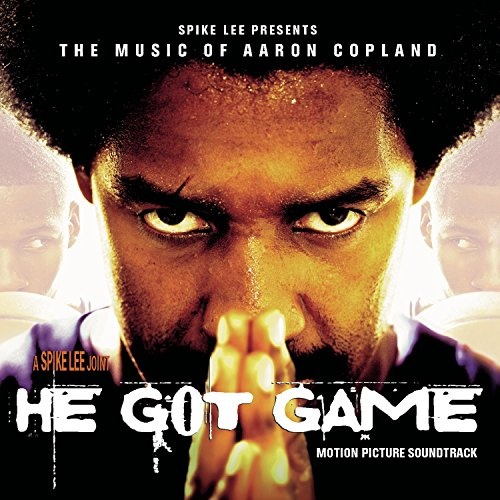
One final point. Just as is the case of The Red Pony above, there is one Copland piece used in the film that didn’t make the soundtrack release? No prizes for guessing. Yep, the gritty, modernist one used for the most pivotal scene. The Orchestral Variations is conspicuous by it’s absence. As always, my work promoting these neglected masterpieces goes on!
Picture credits
“‘He who is not courageous enough to take the risks will accomplish nothing in life’ Muhammad Ali” by Ivan Chinchilla photography is licensed under CC BY 2.0.
“BE023514” by Sabatu is marked with Public Domain Mark 1.0.

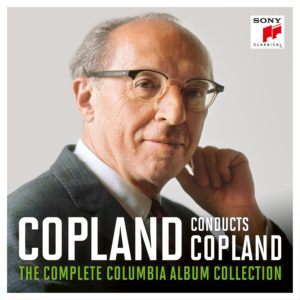
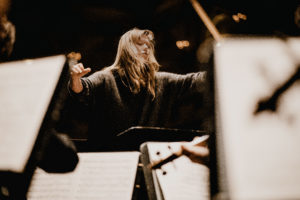
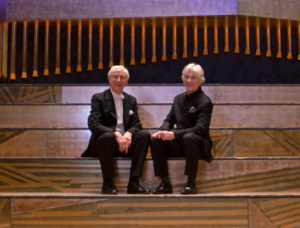





Blog Comments
Kevin Lindegaard
17th June 2024 at 3:51 pm
At the 11th hour of writing this blog I found something quite odd. I decided to do a search for Aaron Copland and March 5, 1958 and found this page on the State University of Iowa website: https://blog.lib.uiowa.edu/rbml/2019/03/19/exploring-our-sounds-sui-orchestra-concert-of-copland-compositions-march-5-1958/
This suggests that Copland was in Iowa City on the evening of this date. This is weird as it means that either
1) Copland wasn’t in Louisville for the premiere and rememebered wrongly in his biography. It wouldn’t be the first occurence of this for sure.
2) Copland didn’t hang around for the Iowa concert but hot footed it down to Louisville (7 hours by road). He had been in Iowa City from the 3rd and gave a talk two days before: https://dailyiowan.lib.uiowa.edu/DI/1958/di1958-03-04.pdf
3) There were actually two Aaron Coplands! Now that would be quite a conspiracy theory!
I will get in touch with the Louisville Orchestra and the Univeristy of Iowa to see if they have any concrete evidence of him being at either concert.
My own view is that Copland would more likely be at the premiere but we’ll see.
The concert played by the State University of Iowa sympohony was quite odd – the first two movements of the Third Symphony and a truncated concert version of The Tender Land – Act 2 followed by the end of Act 1.
Teddy Abrams
25th July 2024 at 4:53 pm
Thank you so much for sharing your remarkable article! Two of my favorite things combined so beautifully – Ali and Copland! I grew up playing the Piano Variations, which I programmed on my graduation recital as a pianist at the San Francisco Conservatory of Music. I was overwhelmed to learn that the Louisville Orchestra had commissioned the orchestrated version, and I’ve programmed the piece a couple times since I got to town. It’s incredibly challenging, as you well know!! I too wonder about Copland and Ali meeting.. what an intersection of history and culture that would have been. Louisville has long been a crossroads of American historical movements so it wouldn’t surprise me if it had happened there.
I did a little research and found this article from the Louisville Courier-Journal, published in 1958. It talks about Copland’s time in Louisville! Seems like he got to town a month or so after the premiere. This is an OCR text interpretation so the formatting and spelling might be weird, but the original scan can be found here: https://www.newspapers.com/newspage/116441047/
I hope this helps, and please stay in touch. Wishing you the very best and thank you again for your note!
Kevin Lindegaard
25th July 2024 at 4:55 pm
I think that makes sense now and the good thing is that Copland would still have been in Louisville probably when Ali was pounding the streets, training for his next bout.
Any news on dates for Ali the Musical? Also, are you planning anything for Copland 125? I will be applying for funds for a grass roots year long festival that will take in this and America 250. Lots of music by alive composers, played by and for children (as well as grown ups). It would be great to get some reciprocal activity as part of it – I have good connections with Copland House. Would be great to get a conversation going on cross fertilisation with the LO too. Any thoughts?
Finally, I would love to know if you are ever likely to put on the Orchestral Variations? Copland said that sometimes “he hit the jackpot” and the orchestral variations were played side by side with the piano variations! You could conduct one and play the other! Just a thought.
Teddy Abrams
25th July 2024 at 4:56 pm
The Ali musical will be opening, most likely, in early 2025 (not in NYC at first, but hopefully moving there soon after). We expect to announce details shortly – I’ll keep you in the loop. I love the idea of continuing to connect these dots! Great point about Copland’s 125th too.. I’ll make sure we give that due consideration in programming.
The double feature with both versions of the Variations is super cool!